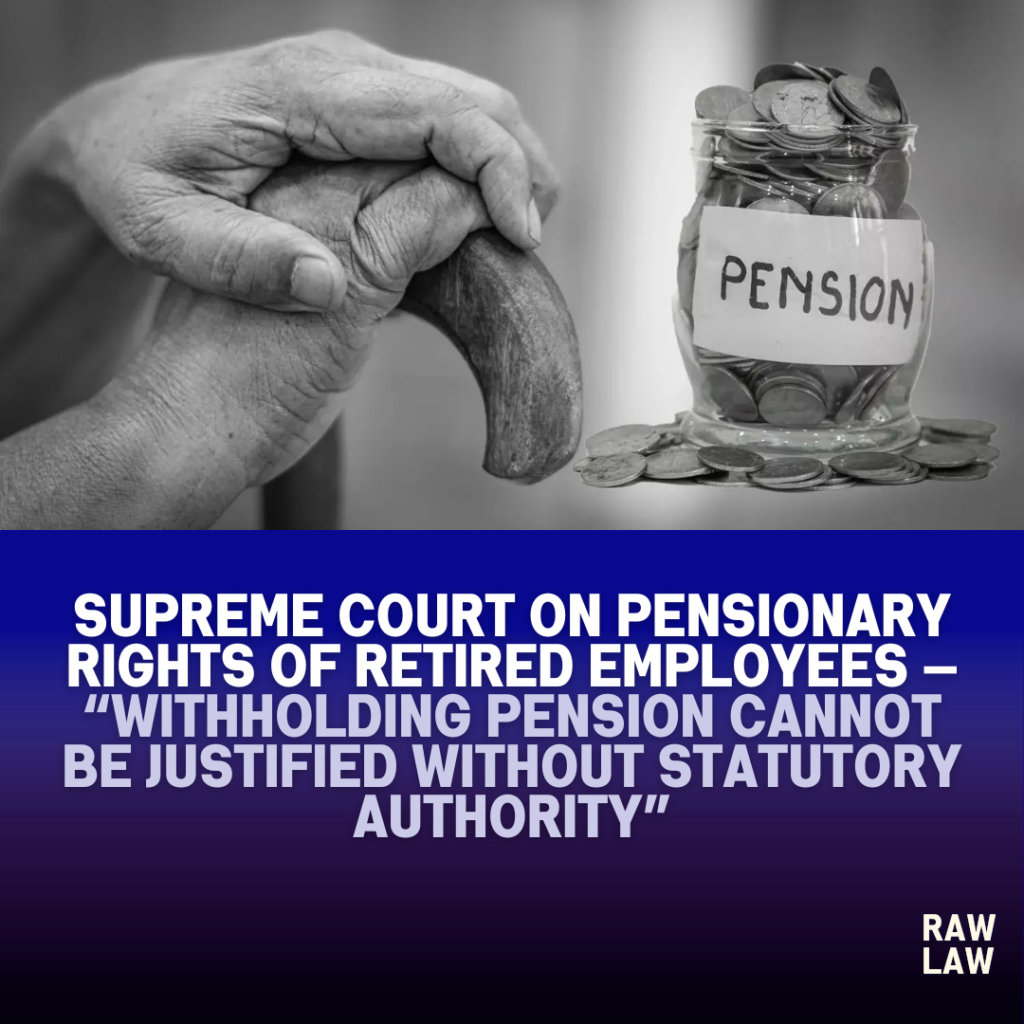Court’s Decision
The Supreme Court held that pension is not a bounty but a right flowing from statutory rules and that withholding or reducing pensionary benefits cannot be justified unless supported by clear statutory provisions. The Court allowed the petition challenging the State’s action of withholding pension and directed that all pensionary dues be released in full. It emphasized that “pension is not a matter of grace but a right, and once conferred by statute, it cannot be arbitrarily curtailed.”
Facts
The case involved a retired government employee whose pensionary benefits were withheld by the State on the ground that certain departmental proceedings had been pending at the time of retirement. The employee challenged the withholding as arbitrary and violative of his constitutional and statutory rights.
The State argued that since the employee had faced departmental action and allegations of misconduct, the government had the discretion to withhold pension till a final decision was reached. The employee, however, contended that in the absence of express statutory provisions enabling such withholding, the government’s action was ultra vires.
The matter came before the Supreme Court after the High Court dismissed the employee’s plea, upholding the State’s right to withhold pension pending disciplinary proceedings.
Issues
- Whether pension constitutes a vested right of a retired employee or remains a bounty granted at the discretion of the State.
- Whether the State is legally empowered to withhold pension in the absence of clear statutory rules authorizing such action.
- Whether pendency of disciplinary proceedings justifies withholding of pensionary dues.
Petitioner’s Arguments
The petitioner argued that pension is earned by an employee after years of service and is recognized as a constitutional right under Article 300A, as held by judicial precedents. It was submitted that pension cannot be withheld without statutory authority. The petitioner relied on landmark cases where the Supreme Court had ruled that pension is not a matter of charity but a right that is enforceable.
The petitioner also emphasized that departmental proceedings had not culminated in any finding of guilt and therefore, denial of pension amounted to punishment without authority of law.
Respondent’s Arguments
The respondent-State contended that the rules governing pension permitted withholding of pension where departmental or judicial proceedings were pending. It was submitted that since allegations of misconduct were serious, the State was justified in protecting its financial interests by deferring pension till the proceedings concluded.
The State also argued that grant of pension carried with it conditions and was not absolute, and therefore, pending determination of misconduct, the government had discretion to withhold.
Analysis of the Law
The Court analyzed the relevant pension rules and constitutional principles. It noted that pension is governed by statutory rules framed under Article 309 of the Constitution, and unless such rules provide for withholding, the State cannot unilaterally deny pension.
The Court emphasized that Article 300A protects property rights, and pension being deferred wages constitutes property. The deprivation of property requires authority of law, not mere executive instructions.
Precedent Analysis
The Court relied on:
- Deokinandan Prasad v. State of Bihar (1971) 2 SCC 330 — where it was held that pension is a right and not a bounty, flowing from statutory rules.
- D.S. Nakara v. Union of India (1983) 1 SCC 305 — where the Court expanded the concept of pension as a measure of socio-economic justice and part of the right to livelihood.
- State of Jharkhand v. Jitendra Kumar Srivastava (2013) 12 SCC 210 — where it was held that pension cannot be withheld in the absence of statutory authority, and executive instructions cannot override statutory rules.
These precedents directly supported the petitioner’s case, reinforcing that pensionary rights cannot be curtailed without explicit statutory backing.
Court’s Reasoning
The Court reasoned that since the pension rules did not authorize withholding of pension on mere pendency of proceedings, the State’s action was arbitrary. It emphasized that “once an employee retires, his entitlement to pension crystallizes, and unless there is a finding of guilt leading to penalty under the rules, pension cannot be withheld.”
The Court further observed that the High Court erred in overlooking binding precedent and in treating pension as discretionary. It reiterated that the constitutional scheme protects pension as property, and the State has no authority to withhold it unless backed by law.
Conclusion
The Supreme Court concluded that the State had acted beyond its powers in withholding the petitioner’s pension. It set aside the High Court’s order, directed immediate release of all pensionary benefits with arrears, and clarified that the State may only proceed against pensionary rights if there is express statutory sanction.
Implications
This ruling strengthens the rights of retired employees, ensuring that pension is treated as a guaranteed entitlement and not as a discretionary benefit. It limits the arbitrary powers of the State and reinforces constitutional protection of pension under Article 300A. The judgment serves as a safeguard for lakhs of retirees against administrative excess and ensures financial security in post-retirement life.
Summary of Cases Referred
- Deokinandan Prasad: Pension is a right under statutory rules.
- D.S. Nakara: Pension is socio-economic justice, not charity.
- Jitendra Kumar Srivastava: Pension cannot be withheld without statutory authority.
These cases were cited to reinforce the principle that executive discretion cannot override statutory entitlements.
FAQs
Q1: Can the government withhold pension during pendency of disciplinary proceedings?
No, unless the pension rules expressly authorize such withholding. The Supreme Court has held that pension cannot be withheld merely because proceedings are pending.
Q2: Is pension a constitutional right?
Yes. Pension is considered a property right under Article 300A and cannot be denied without statutory authority.
Q3: What precedents guided the Supreme Court’s decision?
The Court relied on Deokinandan Prasad, D.S. Nakara, and Jitendra Kumar Srivastava, all affirming that pension is a vested right and not a government bounty.



